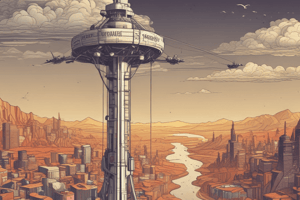Podcast
Questions and Answers
What does opportunity cost refer to?
What does opportunity cost refer to?
- The value of all alternatives available for a certain action or choice
- The cost of pursuing one alternative without considering other options
- The total cost incurred in pursuing a certain action or choice
- The value of the best alternative that must be given up to pursue a certain action or choice (correct)
What is the fundamental concept in microeconomics?
What is the fundamental concept in microeconomics?
- Market equilibrium
- Elasticity of demand
- Opportunity cost (correct)
- Consumer surplus
What is economic decision-making?
What is economic decision-making?
- The process of choosing among different alternatives to maximize utility or value (correct)
- The process of choosing the most expensive alternative
- The process of always selecting the option with the least cost
- The process of making choices without considering costs and benefits
In economic decision-making, what role does opportunity cost play?
In economic decision-making, what role does opportunity cost play?
If a person has to choose between buying a book for $10 or a sandwich for $5, what is the opportunity cost of buying the book?
If a person has to choose between buying a book for $10 or a sandwich for $5, what is the opportunity cost of buying the book?
What is the opportunity cost of buying a new smartphone instead of a laptop?
What is the opportunity cost of buying a new smartphone instead of a laptop?
In economic decision-making, what do trade-offs result from?
In economic decision-making, what do trade-offs result from?
Why is opportunity cost a key concept in understanding consumer behavior?
Why is opportunity cost a key concept in understanding consumer behavior?
What is the opportunity cost of investing in research and development for a company?
What is the opportunity cost of investing in research and development for a company?
How does understanding opportunity cost help individuals and businesses in economic decision-making?
How does understanding opportunity cost help individuals and businesses in economic decision-making?
Study Notes
Microeconomics: Understanding Opportunity Cost and Economic Decision-making
Introduction
Microeconomics is the branch of economics that studies the behavior of individual consumers, firms, and industries. One of the fundamental concepts in microeconomics is the concept of opportunity cost, which plays a crucial role in economic decision-making. In this article, we will explore the concept of opportunity cost, its relation to economic decision-making, and the trade-offs that arise when making such decisions.
Opportunity Cost
Opportunity cost refers to the value of the best alternative that must be given up to pursue a certain action or choice. It is the cost of pursuing one alternative, which is the value of the next best alternative that must be foregone. For example, if a person has to choose between buying a book for $10 or a sandwich for $5, the opportunity cost of buying the book is the value of the sandwich that they had to give up, which is $5.
Economic Decision-making
Economic decision-making is the process of choosing among different alternatives to maximize utility or value. This process involves making trade-offs, where individuals or businesses have to choose between different options, each with its own benefits and costs. The concept of opportunity cost plays a significant role in this decision-making process, as it helps individuals and businesses understand the costs and benefits associated with each alternative.
Trade-offs in Economic Decision-making
Trade-offs are an inherent part of economic decision-making. They arise when individuals or businesses have to choose between different options, each with its own benefits and costs. For example, a consumer may have to choose between buying a new smartphone or a new laptop. The opportunity cost of buying the new smartphone is the value of the laptop that they had to give up. This trade-off is a result of the limited resources available to the individual, such as their budget.
Opportunity Cost and Consumer Behavior
Opportunity cost is a key concept in understanding consumer behavior. When consumers make purchasing decisions, they weigh the benefits of each option against their opportunity cost. For example, a consumer may decide to buy a book instead of going out to dinner with friends. The opportunity cost of buying the book is the value of the dinner with friends, which is foregone. This trade-off is a result of the consumer's limited budget and time.
Opportunity Cost and Business Decision-making
Opportunity cost is also a crucial concept in business decision-making. Companies must continually make trade-offs when allocating their limited resources, such as budget, time, and labor. For example, a company may have to decide between investing in research and development or marketing. The opportunity cost of investing in research and development is the value of the potential sales and profits that could have been generated through marketing. This trade-off is a result of the company's limited resources and the need to allocate them efficiently.
Conclusion
The concept of opportunity cost plays a significant role in economic decision-making, helping individuals and businesses understand the costs and benefits associated with each alternative. By understanding opportunity cost, we can better understand trade-offs and make more informed decisions. This understanding is essential for both consumers and businesses in today's complex and rapidly changing economy.
Studying That Suits You
Use AI to generate personalized quizzes and flashcards to suit your learning preferences.
Description
Test your understanding of opportunity cost, economic decision-making, and trade-offs in microeconomics with this quiz. Explore the concept of opportunity cost, its relation to economic decision-making, and its significance in consumer and business behavior.




